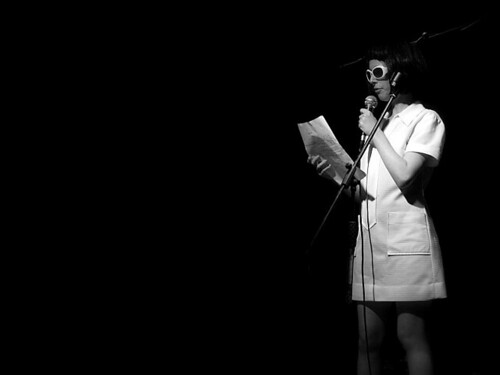 Poetry readings are as much of a sensory experience as they are a thoughtful one. Poems are meant to be felt just as much as they are to be understood. Today, I read at a poetry reading that was meant to celebrate an award that I won. My parents said that I was the best reader there but, to be fair, I have read my poems many times before so I've had much more experience than most of the kids there (I was just as bad, if not worse, the first time that I ever read my poem aloud).
Poetry readings are as much of a sensory experience as they are a thoughtful one. Poems are meant to be felt just as much as they are to be understood. Today, I read at a poetry reading that was meant to celebrate an award that I won. My parents said that I was the best reader there but, to be fair, I have read my poems many times before so I've had much more experience than most of the kids there (I was just as bad, if not worse, the first time that I ever read my poem aloud).
At a poetry reading, the most important thing is to speak the poem clearly and loudly. The mike can only do so much but, as a poet, you have to do the rest. You have to enunciate, making each syllable distinct. You have to make your audience understand each word that you say because, in poetry, each word is incredibly important and one word or line missed might throw off someone's understanding altogether.
You also must speak slowly, again so they don't miss it. Speaking it slowly makes it easier for the audience member to digest and it makes them appreciate and understand the poem so much more. It's also a far more enjoyable experience to them.
For you to convey your meaning, you have to accentuate on the parts that need emphasis (not just the words but each syllable) and you have to pause so they understand that there's a line break (or even to further accentuate it or add some sort of feeling of doom or sorrow). You have to control the way you breathe in the mike and the way you speak each syllable. It's actually pretty complicated, the art of reading a poem, much more complicated than it seems to any sort of outside. But that is how one truly captivates the reader.
You also must speak slowly, again so they don't miss it. Speaking it slowly makes it easier for the audience member to digest and it makes them appreciate and understand the poem so much more. It's also a far more enjoyable experience to them.
For you to convey your meaning, you have to accentuate on the parts that need emphasis (not just the words but each syllable) and you have to pause so they understand that there's a line break (or even to further accentuate it or add some sort of feeling of doom or sorrow). You have to control the way you breathe in the mike and the way you speak each syllable. It's actually pretty complicated, the art of reading a poem, much more complicated than it seems to any sort of outside. But that is how one truly captivates the reader.

The way you read your poem is actually so important especially if your poem isn't as straightforward. The audience may interpret your poem in a variety of ways, depending on how you read it. Poems can be interpreted in all sorts of ways. If you want to convey to the audience your interpretation, you're going to have to add as much emotion as you can to it.
If you read your poem in a way that's dry or long or boring, you might ruin the poem to the audience. If you do the opposite, you might enhance it and make it even better than it sounds.
This takes a lot of practice but, once you get the hang of it, you can really end up making a difference in terms of how your poem is received.
I love listening to poems and listening to how different people read their poems. It's so interesting, especially considering how different poems feel when they're read versus when they're spoken aloud. It's what I love so much about poetry and poetry readings. The best thing about them, I think, is meeting up with other poets and listening to them. That helps me so much in terms of learning how to write and read my poems and it makes it so much better.
Poetry readings are important because they are such an emotional experience and are such a visceral way for you to connect with your audience.


No comments:
Post a Comment